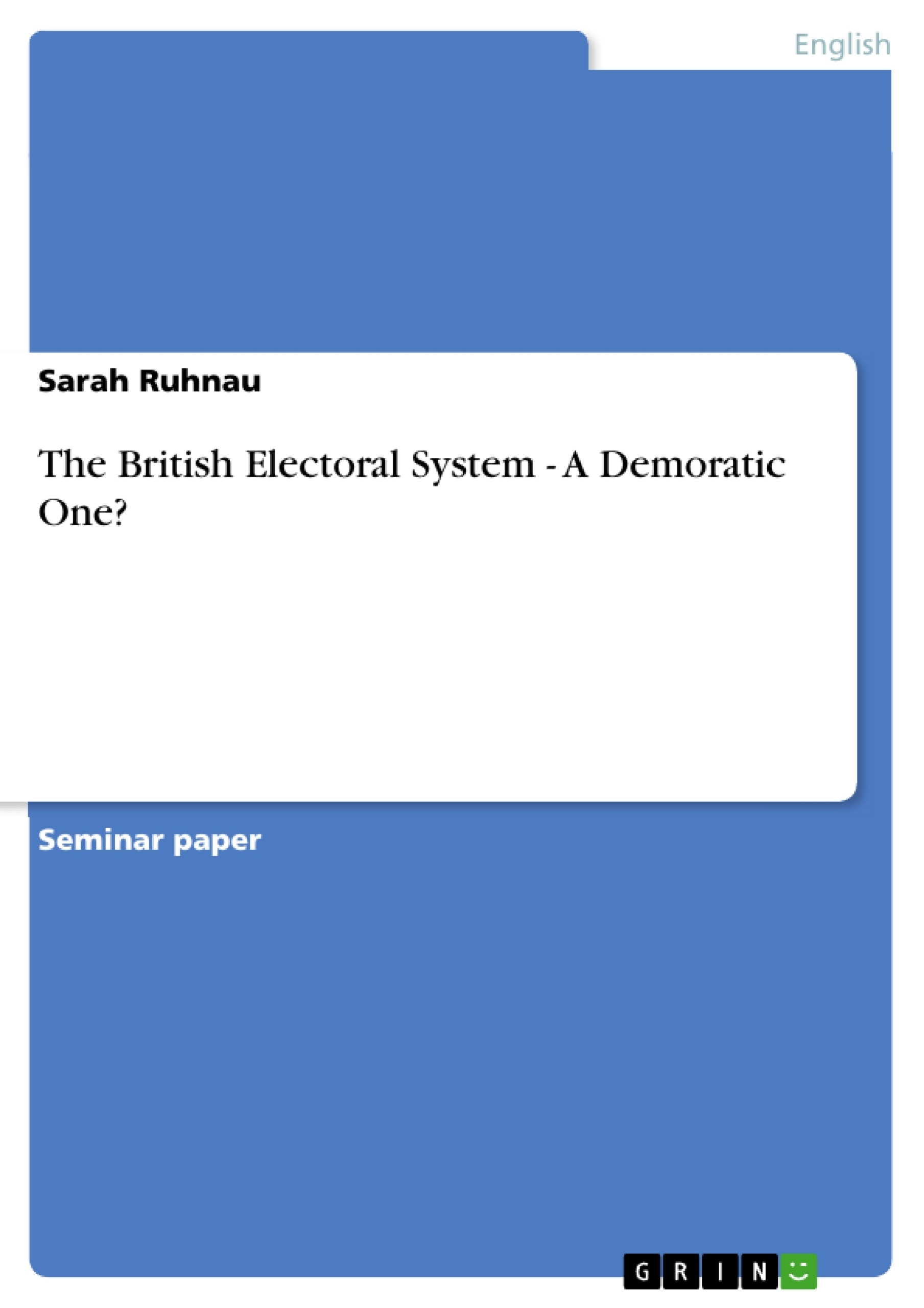1. Introduction
“The British electoral system is not a gamble.” (Butler, 194). This famous quotation by the British political scientist David E. Butler gives a first insight in how intricate and controversial the topic has been discussed. The quotation also shows that the British voting system never lacked criticism and the fact that Butler has to deny that the electoral system of his home country is ‘a gamble’ makes clear that also a lot of sarcasm was involved while judging it. All of this seems rather negative. However, in this paper it is not my aim to just condemn the electoral system of Britain, nor do I want to prove that it is a gamble. Yet, the severe criticism must have a reason and cannot be completely unfounded. A main argument of critics that is often discussed is a possible lack of democracy. Therefore I would like to examine in how far the British voting system can be reconciled with basic democratic principles.
To do so, it will be necessary to give a short overview about democracy and its main features. I also don’t want to neglect to talk about democracy as a political system. In accordance with the main topic, namely the electoral system, I will specifically talk about the competitive and consensus democracy because they are most suitable when it comes to discussing the two main voting systems, viz. proportional representation and majority voting.
As it has probably become clear already, I do not want to limit this paper to the British electoral system itself. To illustrate the discrepancy between the first-past-the-post system and the proportional representation, I will use the example of the Federal Republic of Germany. This country can be seen as a representative for a typical consensus democracy and in addition it is using the proportional representation quite successfully. By providing information about the common alternative system of voting, instead of just describing the system which is actually examined, it will hopefully become easier to judge the latter in the end.
Arguable is now, to what extent the British electoral system deserves to be criticised or even disapproved. Is it “unpredictable” and “bizarre” as Marco Evers claims? (cf. Evers, 84). Or does the long-lasting tradition of using the majority voting system prove once more that its advantages outweigh its weaknesses and that there should not be any worries concerning its democratic compatibility?
Inhaltsverzeichnis (Table of Contents)
- Introduction
- Democracy
- Definition of Democracy
- Consensus Democracy
- Competitive Democracy
- Voting Systems
- Majority Voting Systems using the Example of Great Britain
- Porportional Representation using the Example of the Federal Republic of Germany
- Majority Voting System and Democracy
- Disadvantages of Majority Voting Systems
- The Majority Voting System and its Compatibility with Democratic Principles
- Conclusion
Zielsetzung und Themenschwerpunkte (Objectives and Key Themes)
This paper aims to examine the British electoral system and assess its compatibility with basic democratic principles. The author argues that the system has been criticized for its potential lack of democracy and seeks to explore this issue in detail.
- The definition of democracy and its key features
- The characteristics of consensus and competitive democracies
- The comparison between majority voting systems and proportional representation
- The advantages and disadvantages of majority voting systems
- The compatibility of the British electoral system with democratic principles
Zusammenfassung der Kapitel (Chapter Summaries)
- Introduction: Introduces the topic of the British electoral system and its controversial nature. The paper aims to analyze the system's compatibility with democratic principles.
- Democracy: This chapter provides a concise definition of democracy, emphasizing the 'rule of people' and its inherent features, such as the role of representatives, the importance of majority rule, and the need for mechanisms to express the people's will through elections and participation.
- Consensus Democracy: This chapter focuses on consensus democracies, using the Federal Republic of Germany as an example. It highlights features such as proportional representation, coalition governments, and the incorporation of pressure groups.
- Competitive Democracy: This chapter discusses competitive democracies, again using Great Britain as an example. It emphasizes the concentration of power in one-party cabinets, the competition between two main parties, and the potential influence of other parties.
- Majority Voting System and Democracy: This chapter analyzes the advantages and disadvantages of majority voting systems, exploring their compatibility with democratic principles. It considers potential criticisms, including the lack of proportionality and representation.
Schlüsselwörter (Keywords)
This paper focuses on key concepts such as democracy, electoral systems, majority voting, proportional representation, consensus democracy, competitive democracy, and the compatibility of the British electoral system with democratic principles. It provides a comparative analysis of different voting systems and explores their potential implications for democratic representation.
Frequently Asked Questions
Is the British electoral system democratic?
The paper examines this controversial topic, weighing the system's tradition and stability against criticisms regarding proportionality and representation.
What is the "First-Past-The-Post" system?
It is a majority voting system where the candidate with the most votes in a constituency wins, regardless of whether they have an absolute majority.
How does it differ from proportional representation?
Proportional representation (like in Germany) aims to match the percentage of seats in parliament to the percentage of total votes received by a party.
What is a competitive democracy?
Using Great Britain as an example, it features power concentrated in one-party cabinets and competition between two dominant parties.
What are the main disadvantages of majority voting?
Critics point to the potential for "wasted votes" and the under-representation of smaller parties at the national level.
- Quote paper
- Sarah Ruhnau (Author), 2010, The British Electoral System - A Demoratic One?, Munich, GRIN Verlag, https://www.grin.com/document/160121



